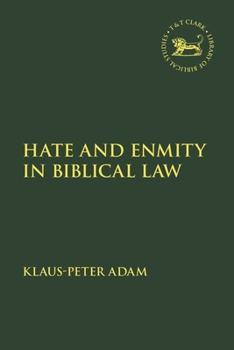Hate and Enmity in Biblical Law
Select Format
Select Condition 
Book Overview
Enmity between individuals was an ubiquitious phenomenon in the ancient world. Using the method of legal anthropology this book examines patterns of hate-driven feuding in kinship-based and segmentary societies and applies these insights to biblical law. It defines the fundamental categories of enmity, love, revenge, honor and shame in the context of feuding and it illustrates certain legal actions, such giving false witness, and shows how they are expressions of hateful relationships.
Adam proposes that we should understand hate between individuals as a legal construct that becomes visible when lived out as private enmity, a social status that exhibits distinct hallmarks. In kinship-based societies, private hate/enmity was publicly declared and, consequently, was publicly known in one's own kin and beyond. Private enmity was acted out in feud-like patterns, with a flexibility that allowed opponents to choose between various measures to hurt their opponent. Acting out hate was reciprocal, and it typically escalated and swiftly expanded into one party's attempt to kill the other and to trigger a blood feud. Finally, private enmity was "transitive" in the sense that opponents at enmity naturally expected solidarity from kin and friends.
Adam uses textual analysis to illustrate how the legal construct of hate informs biblical law from the Covenant Code, to Deuteronomic and Priestly Legislation, including the Holiness Code. He also demonstrates how hate forms the backdrop of conflict settlement. Ultimately, by ways of tracing back through the category of private hate and enmity, this book unpacks the meaning of the quintessential command to "Love your neighbor "
Adam proposes that we should understand hate between individuals as a legal construct that becomes visible when lived out as private enmity, a social status that exhibits distinct hallmarks. In kinship-based societies, private hate/enmity was publicly declared and, consequently, was publicly known in one's own kin and beyond. Private enmity was acted out in feud-like patterns, with a flexibility that allowed opponents to choose between various measures to hurt their opponent. Acting out hate was reciprocal, and it typically escalated and swiftly expanded into one party's attempt to kill the other and to trigger a blood feud. Finally, private enmity was "transitive" in the sense that opponents at enmity naturally expected solidarity from kin and friends.
Adam uses textual analysis to illustrate how the legal construct of hate informs biblical law from the Covenant Code, to Deuteronomic and Priestly Legislation, including the Holiness Code. He also demonstrates how hate forms the backdrop of conflict settlement. Ultimately, by ways of tracing back through the category of private hate and enmity, this book unpacks the meaning of the quintessential command to "Love your neighbor "
Format:Paperback
Language:English
ISBN:0567706494
ISBN13:9780567706492
Release Date:December 2023
Publisher:T&T Clark
Length:320 Pages
Weight:0.98 lbs.
Dimensions:0.7" x 6.1" x 9.2"
Customer Reviews
0 rating





